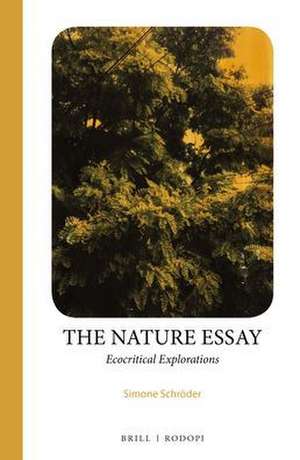The Nature Essay: Ecocritical Explorations: Nature, Culture and Literature, cartea 14
Autor Simone Schröderen Limba Engleză Hardback – 20 mar 2019
Authors discussed include: Alexander von Humboldt, Henry David Thoreau, Virginia Woolf, Robert Musil, Ernst Jünger, W.G. Sebald, Kathleen Jamie, and David Foster Wallace.
Preț: 522.07 lei
Preț vechi: 636.67 lei
-18% Nou
Puncte Express: 783
Preț estimativ în valută:
99.90€ • 104.68$ • 82.58£
99.90€ • 104.68$ • 82.58£
Carte indisponibilă temporar
Doresc să fiu notificat când acest titlu va fi disponibil:
Se trimite...
Preluare comenzi: 021 569.72.76
Specificații
ISBN-13: 9789004360389
ISBN-10: 9004360387
Pagini: 230
Dimensiuni: 155 x 235 x 20 mm
Greutate: 0.5 kg
Editura: Brill
Colecția Brill
Seria Nature, Culture and Literature
ISBN-10: 9004360387
Pagini: 230
Dimensiuni: 155 x 235 x 20 mm
Greutate: 0.5 kg
Editura: Brill
Colecția Brill
Seria Nature, Culture and Literature
Cuprins
Acknowledgements
Introduction
1 Why the Nature Essay?
2 Nature Writing Revisited: Method and Scope of this Study
3 Roaming in an Interdisciplinary Field: Textual Corpus
4 Outline of Content
1 The Nature Essay and Genre
1 Aspects of the Essay: Characteristics of Form and Function
1.1The Arrival of the Nature Essay around 1800
2 Ways of Knowing and Making Sense of Nature
2.1Reflection, Description, Introspection – Communication of Knowledge in the Nature Essay
2.2Epistemes: Encyclopaedic-Scientific, Metaphysical-Spiritual, Ethical
2“The Butterfly Collector”: The Encyclopaedic-Scientific Episteme
1.1 The Aesthetics of Collecting and Connecting in Alexander von Humboldt’sIdeen zu einer Physiognomie der Gewächse and Ernst Jünger’s Subtile Jagden
1.1 Alexander von Humboldt, Ideen zu einer Physiognomik der Gewächse
1.2 Ernst Jünger,Subtile Jagden
2 Measuring and Mapping Nature in the Nineteenth Century: Henry David Thoreau’sThe Pond in Winterand Alexander von Humboldt’s Über die Steppen und Wüsten
2.1 Alexander von Humboldt, Über die Steppen und Wüsten
2.2 Henry David Thoreau’s Survey of Walden Pond
3 Data Prose – Contemporary Nature Essay Writing: Eliot Weinberger’s Naked Mole-Rats, David Foster Wallace’s Consider the Lobster, and Andreas Martin Widmann’s Mind Gardens
3.1 Eliot Weinberger,Naked Mole-Rats
3.2 David Foster Wallace,Consider the Lobster
3.3 Andreas Martin Widmann,Mind Gardens
3“Mother Nature’s Son”: The Metaphysical-Spiritual Episteme
1 Epiphanic Moments and Revelations: J.A. Baker’sThe Peregrine and Kathleen Jamie’sPeregrines, Ospreys, Cranes
1.1 J.A. Baker,The Peregrine
1.2 Kathleen Jamie,Peregrines, Ospreys, Cranes
2 The Dying Animal: Unsettling Human-Insect Relations through Elegy and Irony in Virginia Woolf’sThe Death of the Mothand Robert Musil’s DasFliegenpapier
2.1 Virginia Woolf,The Death of the Moth
2.2 Robert Musil, Das Fliegenpapier
3 Tales of Transformation and Experience: Thoreau’sWaldenand Andreas Maier and Christine Büchner’sBullau. Versuch über Natur
3.1 Henry David Thoreau, Walden
3.2 Andreas Maier and Christine Büchner,Bullau. Versuch über Natur
4“Animal Farm”: The Ethical Episteme – Animal Ethics, Stories of Decline, and Writing Entangled Agencies
1 Aesthetics of Empathy and Shock: Animal Ethics
2 Stories of Decline: The Apocalypse Template
3 Decentred Perspectives: Writing Entangled Agencies
Conclusion: Paradigm Shifts in the Nature Essay
1 Panoramic Outlook
Bibliography
Index
Introduction
1 Why the Nature Essay?
2 Nature Writing Revisited: Method and Scope of this Study
3 Roaming in an Interdisciplinary Field: Textual Corpus
4 Outline of Content
1 The Nature Essay and Genre
1 Aspects of the Essay: Characteristics of Form and Function
1.1The Arrival of the Nature Essay around 1800
2 Ways of Knowing and Making Sense of Nature
2.1Reflection, Description, Introspection – Communication of Knowledge in the Nature Essay
2.2Epistemes: Encyclopaedic-Scientific, Metaphysical-Spiritual, Ethical
2“The Butterfly Collector”: The Encyclopaedic-Scientific Episteme
1.1 The Aesthetics of Collecting and Connecting in Alexander von Humboldt’sIdeen zu einer Physiognomie der Gewächse and Ernst Jünger’s Subtile Jagden
1.1 Alexander von Humboldt, Ideen zu einer Physiognomik der Gewächse
1.2 Ernst Jünger,Subtile Jagden
2 Measuring and Mapping Nature in the Nineteenth Century: Henry David Thoreau’sThe Pond in Winterand Alexander von Humboldt’s Über die Steppen und Wüsten
2.1 Alexander von Humboldt, Über die Steppen und Wüsten
2.2 Henry David Thoreau’s Survey of Walden Pond
3 Data Prose – Contemporary Nature Essay Writing: Eliot Weinberger’s Naked Mole-Rats, David Foster Wallace’s Consider the Lobster, and Andreas Martin Widmann’s Mind Gardens
3.1 Eliot Weinberger,Naked Mole-Rats
3.2 David Foster Wallace,Consider the Lobster
3.3 Andreas Martin Widmann,Mind Gardens
3“Mother Nature’s Son”: The Metaphysical-Spiritual Episteme
1 Epiphanic Moments and Revelations: J.A. Baker’sThe Peregrine and Kathleen Jamie’sPeregrines, Ospreys, Cranes
1.1 J.A. Baker,The Peregrine
1.2 Kathleen Jamie,Peregrines, Ospreys, Cranes
2 The Dying Animal: Unsettling Human-Insect Relations through Elegy and Irony in Virginia Woolf’sThe Death of the Mothand Robert Musil’s DasFliegenpapier
2.1 Virginia Woolf,The Death of the Moth
2.2 Robert Musil, Das Fliegenpapier
3 Tales of Transformation and Experience: Thoreau’sWaldenand Andreas Maier and Christine Büchner’sBullau. Versuch über Natur
3.1 Henry David Thoreau, Walden
3.2 Andreas Maier and Christine Büchner,Bullau. Versuch über Natur
4“Animal Farm”: The Ethical Episteme – Animal Ethics, Stories of Decline, and Writing Entangled Agencies
1 Aesthetics of Empathy and Shock: Animal Ethics
2 Stories of Decline: The Apocalypse Template
3 Decentred Perspectives: Writing Entangled Agencies
Conclusion: Paradigm Shifts in the Nature Essay
1 Panoramic Outlook
Bibliography
Index
Notă biografică
Simone Schröder, Ph.D. (2017), University of Bath, is Head of Programme at the International Literature Festival Berlin. She publishes on nature writing and climate fiction.









